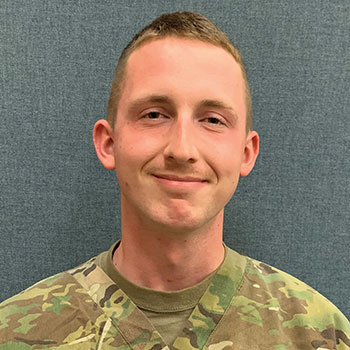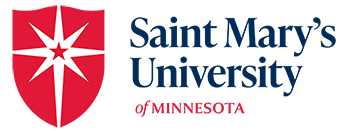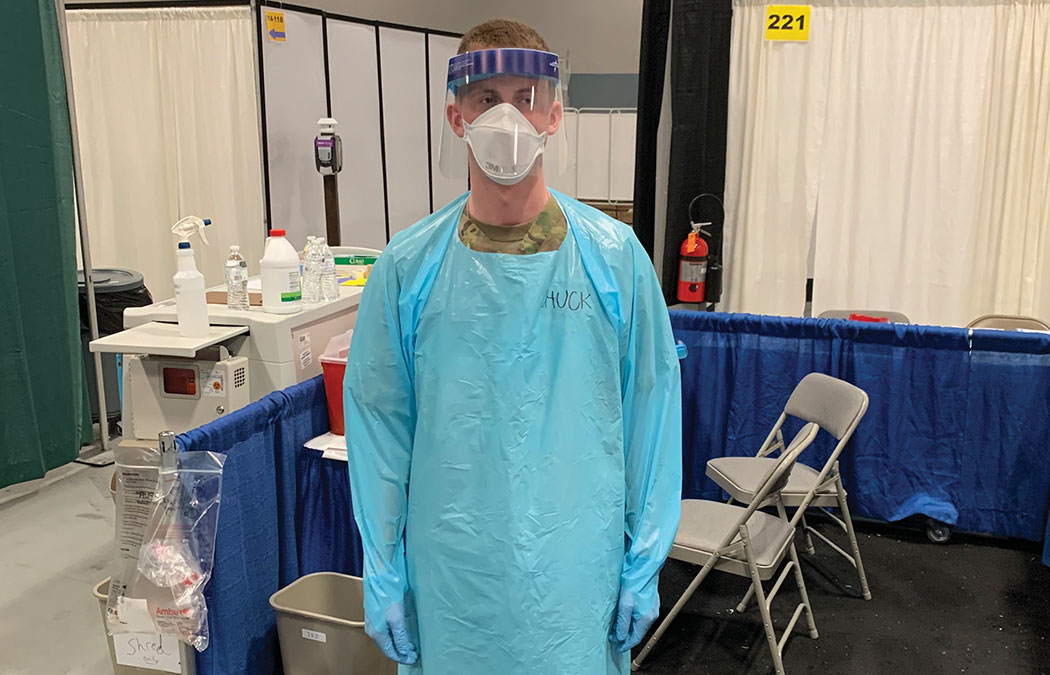As an Army Reserve medic, Sgt. Chuck Thibault ’21 is trained for trauma situations in battle, things such as gunshots and explosions.
He never dreamed he’d be working 12-hour shifts battling the coronavirus in the epicenter of this pandemic. But when he describes his work, which can be tiring and challenging, the words he chooses instead are rewarding and meaningful.
The junior criminal justice major from Shoreview, Minn., joined the Army Reserve nearly three years ago out of a desire to help others and a love for his country.
This spring he joined the more than 900 service members who were mobilized to combat the pandemic. In April, he and others in the 807th MC (DS) COVID-19 Army Reserve medical response team arrived in Edison, N.J., to work at a convention center converted into a make-shift hospital.
Thibault worked the night shift, where he helped to treat COVID-19 positive patients who were transferred in from other area hospitals.
The facility, he explained, was established to provide overflow care, take some strain off local hospitals, and provide needed relief for area medical personnel. Sgt. Thibault said he and other medical staff watched their patient numbers increase quickly. He estimated he personally saw about 20-30 patients each day, many of whom only spoke Spanish.
“I’ve taken many years of Spanish, and luckily I paid attention in class,” he said.
“I was able to ask them if they had pain or if they would like anything. I could tell them I was going to take their temperature. That was all really helpful because I would have been scared if I were them.

Sgt. Chuck Thibault ’21
“First they got sick with this virus, and when they came to our facility, everyone was all dressed up in personal protective equipment (PPE) so they couldn’t really see our faces. We tried to be friendly with them and put them at ease and conversed with them to get them as comfortable as we could.”
Located just 45 minutes from downtown New York City, Sgt. Thibault said he knew he was working in the epicenter of the pandemic. As he’s young and healthy, he worried less for his own personal safety than for those he worked with.
At the start of his shift, he carefully suited up in his PPE. Should he need to use the restroom or get a drink, he had to carefully remove his PPE, sanitize, and wash, and then dress in new PPE before re-entering.
Patients transferred to his facility were typically on oxygen but were relatively stable. “We gave them medications and tried to wean them off of oxygen,” he said. “They didn’t need to be in the ICU, but they weren’t ready to go home yet either. Our goal was to get them stable and healthy and then discharge them.
“It was a good feeling to get people out of there. You knew you were making a difference. The best part was knowing you were there helping people in an area where they really needed it, so it was very rewarding.”
Sgt. Thibault said he’s grateful to Saint Mary’s for allowing him to take a leave of absence and still complete his studies. And he was grateful for being able to virtually talk to friends and family back home. “I’m not really one to get down easily,” he said. “I knew it would be worse if we weren’t there, so it was easier to put it all into perspective. Someone had to be here, and I’m glad it was me and the others I worked with.”
It was difficult, he admitted, to not know how long he would be stationed so far from home. “The unknown can be daunting, and the whole situation was and is unknown,” he said. “I knew there were people back home doing well, and I know that this will all be over eventually. There’s light at the end of the tunnel.”
Thibault ’21 is trained for trauma situations in battle, things such as gunshots and explosions.
“It was a good feeling to get people out of there. You knew you were making a difference. The best part was knowing you were there helping people in an area where they really needed it, so it was very rewarding.”
Sgt. Thibault said he’s grateful to Saint Mary’s for allowing him to take a leave of absence and still complete his studies. And he was grateful for being able to virtually talk to friends and family back home. “I’m not really one to get down easily,” he said. “I knew it would be worse if we weren’t there, so it was easier to put it all into perspective. Someone had to be here, and I’m glad it was me and the others I worked with.”
It was difficult, he admitted, to not know how long he would be stationed so far from home. “The unknown can be daunting, and the whole situation was and is unknown,” he said. “I knew there were people back home doing well, and I know that this will all be over eventually. There’s light at the end of the tunnel.”
Photo caption: Chuck Thibault ’21 at work in a make-shift hospital in New Jersey.

